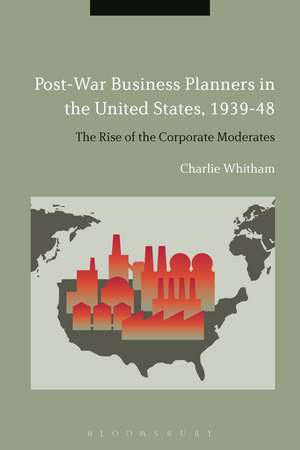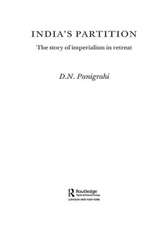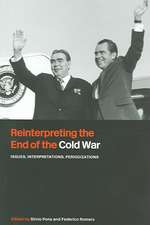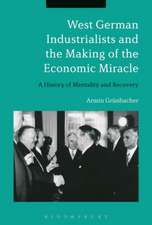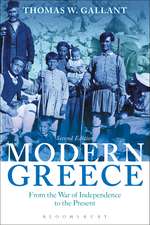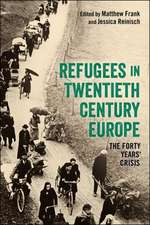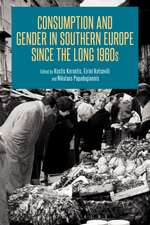Post-War Business Planners in the United States, 1939-48: The Rise of the Corporate Moderates
Autor Dr Charlie Whithamen Limba Engleză Paperback – 18 apr 2018
| Toate formatele și edițiile | Preț | Express |
|---|---|---|
| Paperback (1) | 239.02 lei 6-8 săpt. | |
| Bloomsbury Publishing – 18 apr 2018 | 239.02 lei 6-8 săpt. | |
| Hardback (1) | 772.98 lei 6-8 săpt. | |
| Bloomsbury Publishing – 19 oct 2016 | 772.98 lei 6-8 săpt. |
Preț: 239.02 lei
Preț vechi: 306.42 lei
-22% Nou
Puncte Express: 359
Preț estimativ în valută:
45.74€ • 47.58$ • 37.76£
45.74€ • 47.58$ • 37.76£
Carte tipărită la comandă
Livrare economică 14-28 aprilie
Preluare comenzi: 021 569.72.76
Specificații
ISBN-13: 9781350067271
ISBN-10: 135006727X
Pagini: 304
Dimensiuni: 156 x 234 mm
Greutate: 0.43 kg
Ediția:NIPPOD
Editura: Bloomsbury Publishing
Colecția Bloomsbury Academic
Locul publicării:London, United Kingdom
ISBN-10: 135006727X
Pagini: 304
Dimensiuni: 156 x 234 mm
Greutate: 0.43 kg
Ediția:NIPPOD
Editura: Bloomsbury Publishing
Colecția Bloomsbury Academic
Locul publicării:London, United Kingdom
Caracteristici
Offers a nuanced understanding of how American foreign economic policy was formed during WW2
Notă biografică
Charlie Whitham is Senior Lecturer in American History at Edge Hill University, UK.
Cuprins
PrefaceContext & Themes1. The Planners before 19392. The Stimulus of War in Europe, 1939-413. Total War, Total Planning, 19424. The Challenge of Conservatism, 1943-445. The International Question, 1944-456. Consensus and Convergence, 1945-48ConclusionsAppendicesNotesBibliographyIndex
Recenzii
During WW II, some US business leaders formed organizations to plan for the postwar economy and to provide social and economic policy options for the US government. A fundamental motivation was to avoid an economic relapse into the Great Depression and a desire to continue the massive US wartime production. Diplomatic historian Whitham (Edge Hill Univ., UK) meticulously examines these various organizations, especially the Committee for Economic Development (CED), National Planning Association (NPA), and Twentieth Century Fund (TCF) . Drawing upon new archival material on the NPA and the TCF, Whitham depicts the tensions between "corporate liberals" and their New Deal vision of government involvement and business conservatives who espoused laissez-faire, which led to the emergence of "corporate moderates" in the CED that dominated the postwar years.
This is a timely book. America's in the midst of a political crisis, its financial system privileges the very wealthiest groups in society, and the lone superpower's global mission is challenged by the emergence of new powers. But where are its business organisations and intellectuals in crafting a new settlement at home and abroad that promotes the American dream, however limited it may be? Charlie Whitham's exhaustive new study examines the much more far-sighted generation of corporate liberals who emerged from the depths of depression and world war to shape a new order through concrete, history-making interventions that reimagined and re-engineered the economy, polity and state, yielding prosperity at home that sustained the New Deal political order for decades. It contains a rich, archive-based record from which the current globalised American financial community has much to learn. This is recommended reading for the intellectuals of the Right as much as the Democratic Left on how to shape a new order.
Based on rich new archival findings and many years of careful research, this exciting book demonstrates the large role of American corporate leaders in shaping the post-World War II world on economic, trade, and monetary issues. It first reveals the precise ways in which the ideas of the few "corporate liberals" in the business community were adapted and incorporated by the larger group of corporate moderates, who had the advice of leading university economists and several avenues of access to government decision-makers. In addition, it explains how these corporate moderates were able to fend off most liberal-labor initiatives as well as the plans put forth by arch-conservatives.
This is a timely book. America's in the midst of a political crisis, its financial system privileges the very wealthiest groups in society, and the lone superpower's global mission is challenged by the emergence of new powers. But where are its business organisations and intellectuals in crafting a new settlement at home and abroad that promotes the American dream, however limited it may be? Charlie Whitham's exhaustive new study examines the much more far-sighted generation of corporate liberals who emerged from the depths of depression and world war to shape a new order through concrete, history-making interventions that reimagined and re-engineered the economy, polity and state, yielding prosperity at home that sustained the New Deal political order for decades. It contains a rich, archive-based record from which the current globalised American financial community has much to learn. This is recommended reading for the intellectuals of the Right as much as the Democratic Left on how to shape a new order.
Based on rich new archival findings and many years of careful research, this exciting book demonstrates the large role of American corporate leaders in shaping the post-World War II world on economic, trade, and monetary issues. It first reveals the precise ways in which the ideas of the few "corporate liberals" in the business community were adapted and incorporated by the larger group of corporate moderates, who had the advice of leading university economists and several avenues of access to government decision-makers. In addition, it explains how these corporate moderates were able to fend off most liberal-labor initiatives as well as the plans put forth by arch-conservatives.
